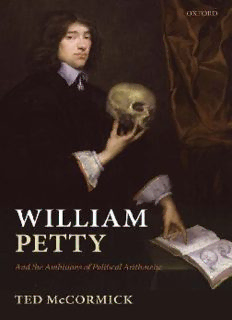
William Petty: And the Ambitions of Political Arithmetic PDF
Preview William Petty: And the Ambitions of Political Arithmetic
WILLIAM PETTY This page intentionally left blank WILLIAM PETTY And the Ambitions of Political Arithmetic TED McCORMICK 1 1 GreatClarendonStreet,Oxfordox26dp OxfordUniversityPressisadepartmentoftheUniversityofOxford. ItfurtherstheUniversity’sobjectiveofexcellenceinresearch,scholarship, andeducationbypublishingworldwidein Oxford NewYork Auckland CapeTown DaresSalaam HongKong Karachi KualaLumpur Madrid Melbourne MexicoCity Nairobi NewDelhi Shanghai Taipei Toronto Withofficesin Argentina Austria Brazil Chile CzechRepublic France Greece Guatemala Hungary Italy Japan Poland Portugal Singapore SouthKorea Switzerland Thailand Turkey Ukraine Vietnam OxfordisaregisteredtrademarkofOxfordUniversityPress intheUKandincertainothercountries PublishedintheUnitedStates byOxfordUniversityPressInc.,NewYork ©TedMcCormick2009 Themoralrightsoftheauthorhavebeenasserted DatabaserightOxfordUniversityPress(maker) Firstpublished2009 Allrightsreserved.Nopartofthispublicationmaybereproduced, storedinaretrievalsystem,ortransmitted,inanyformorbyanymeans, withoutthepriorpermissioninwritingofOxfordUniversityPress, orasexpresslypermittedbylaw,orundertermsagreedwiththeappropriate reprographicsrightsorganization.Enquiriesconcerningreproduction outsidethescopeoftheaboveshouldbesenttotheRightsDepartment, OxfordUniversityPress,attheaddressabove Youmustnotcirculatethisbookinanyotherbindingorcover andyoumustimposethesameconditiononanyacquirer BritishLibraryCataloguinginPublicationData Dataavailable LibraryofCongressCataloginginPublicationData McCormick,Ted. WilliamPettyandtheambitionsofpoliticalarithmetic/TedMcCormick. p.cm. Includesbibliographicalreferencesandindex. ISBN978–0–19–954789–0(hbk.) 1. Petty,William,Sir,1623–1687.2. Economics—Politicalaspects—History—17thcentury. 3. GreatBritain—Politicsandgovernment—1603–1714.I.Title. HB103.P5M352009 330.15’3092—dc22 [B] 2009020071 TypesetbyLaserwordsPrivateLimited,Chennai,India PrintedinGreatBritain onacid-freepaperby MPGBiddlesLtd,King’sLynn,Norfolk ISBN978–0–19–954789–0 1 3 5 7 9 10 8 6 4 2 ToTheresa This page intentionally left blank Contents Preface viii Acknowledgements x ListofIllustrations xiii ListofAbbreviations xiv NotetotheReader xvi 1 Introduction:WilliamPettyandPoliticalArithmetic 1 14 . FromRomseytoParis 2 40 . TheMakingofaVirtuoso 3 84 . SurveyingIreland 4 119 . ScienceandPolicyintheRestoration 5 168 . TheTransmutationoftheIrish 6 209 . Corpuscles,ColoniesandKingdoms 7 259 . PoliticalArithmeticinCirculation 8 285 . DeathandAfterlife 303 Conclusion:WilliamPetty’sPoliticalScience 306 Epilogue:FromPettytoMarx 313 Bibliography 335 Index Preface By design, this is a somewhat unusual book. My aim has been to explore what the title refers to as the ‘ambitions’ of politicalarithmetic; exploring these has compelled me to delve deeply into the intellectual biography of William Petty, political arithmetic’s inventor and for approximately two decades its sole practitioner. The result is neither a simple biography of Petty nor a straightforward study of political arithmetic, but an attempt to locate the origins, means, and ends of political arithmetic in the multiplicity of intellectual, political, and social contexts Petty inhabited. ThefewconventionalbiographiesthatnarratePetty’sbirth,ascent,apogee, decline,death,andhistoricalsignificanceareapttoascribehismultifarious interestsandinnumerableprojects—scientific,economic,political—tohis ‘genius’.Thisnotionofgeniusis,ineffect,ablackbox:lessanexplanation thanablankspacewhereanexplanation,ifweonlyhadone,wouldgo.The many studies of Petty’s political arithmetic, on the other hand—though increasingly alive to its multifaceted nature—invariably dwell on his ‘contribution’tolaterdevelopmentsinthesocialsciences,andinparticular to recognizable components of economic theory. That the boundaries of current theory can be applied to his work without hampering historical understandingisnevermorethanprovisionallyquestioned. I have avoided reference to Petty’s ‘genius’ and reserved for the final chapter my consideration of his ‘contribution’ to later social science. My ownapproach,fromthebeginning,hasbeentopursuepoliticalarithmetic throughPetty’smanuscriptsandprintedworks(verymuchinthatorder), and to build up from the evidence preserved in the archive a picture of what Petty intended his invention to do, how, and why. I could not have foreseen when I began just how far afield—or through how many fields—thispursuitwouldultimatelytakeme,butitbecameapparentearly onthatgraspingpoliticalarithmeticwouldrequirepayingcloserattention to Petty’s intellectual background and political concerns than to any retrospectively composed canon of economic literature. Two points have grown progressively clearer over the course of my work. First, political arithmetic was intended not to describe the economy but to assist the preface ix state;itwaslessaboutrepresentationthanintervention.Second,boththe mechanisms of intervention Petty proposed and the framework within whichthesemadesensewerederivedfromnaturalphilosophy. This book traces the process by which Petty evolved something that could later be taken for social science from an engagement with certain strandsofseventeenth-centurynaturalphilosophyandaseriesofpolitical crisesinInterregnumandRestorationEnglandandIreland.Centraltothis processwerePetty’sgrowing‘ambitions’:scientificambitionswithpolitical implications, and political ambitions that mobilized scientific resources. If political arithmetic’s ambitions resonate more closely with early mod- ern science than with modern economics, however, its established place in the historiography of social science raises intriguing questions about their fate. Petty’s extension of corpuscularian matter theory, alchemical transmutation, and a mechanical worldview facilitated the ‘Operations of Authority’ by reducing land and population to elementary particles, homogeneous and politically vacuous units at the disposal of the crown. It reoriented policy—as Francis Bacon and his followers sought to re- orient philosophy—from playing with words to manipulating things. It promised, finally, to end history: perhaps not, as Bacon had predicted, in an apocalyptic sense, but rather in the sense that it would confer on the crown the power both to undo the damage of past policy and to remake both land and people—again and again, if necessary—in its own image. If all this sounds foreign to modern social analysis and antithetical to liberaldemocracy,itiswelltorememberthatourownagehasseensocial scientists proclaim ‘the end of history’ and politicians claim the power to ‘create[their]ownreality’.Onlybysettingasidethequestionoftheoretical ‘contributions’ and treating ‘genius’ as an explanatory tool of last resort canweseethatpoliticalarithmetic’smostgrandandterribleambitionsare alsoourown.
